|
儒家的人文思想与现代汉学家的理解
Confucian Humanism (excerpts) and Views of Modern Sinologists
|
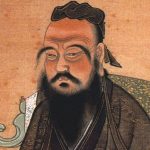 Born in 551 B.C. in the state of Lu, in the southern part of the present Shandong province in eastern China, Confucius was poor in his youth, but entered the government of Lu and by the time he was 50 had reached high official rank. Due to political intrigue, he was soon forced to resign and go into exile. For 13 years, he traveled from state to state, hoping to realize his ideal of political and social reform. Succeeding in nowhere, he returned to Lu where he died 3 years later in 479 B.C. |
| 君子不器。A man of honor is not a an instrument. |
| 富与贵是人之所欲也、不以其道得之、不处也。贫与贱是人之所恶也、不以其道得之、不去也。Riches and honors are what men desire. If it can’t be obtained in the proper way, they should not be held. Poverty and meanness are what men dislike. If it can’t be obtained in the proper way, they should not be avoided. Analects, Book IV |
德者本也。财者末也。外本内末争民施夺。
Virtue is the root; wealth is the result. If he makes the root his secondary object, and the result his primary, he will only wrangle with his people, and teach them rapine. |
仁者以财发身,不仁者以身发财。
The virtuous ruler, by means of his wealth, makes himself more distinguished. The vicious ruler accumulates wealth at the expense of his life. |
三军可夺帅,匹夫不可夺志。《论语》
The commander of the forces of a large state may be carried off, but the will of even a common man cannot be taken from him.
——The Analects
|
| 叶公语孔子曰、吾党有直躬者、其父攘羊而子证正之。孔子曰、吾党之直者异于是、父为子隐子为父隐、直在其中矣。The Duke of She informed Confucius saying “Among us here are those who may be styled upright in their conduct. If their father have stolen a sheep, they will bear witness to the fact.” Confucius said “Among us, in our part of the country, those who are upright are different from this. The father conceals the misconduct of the son, and the son conceals the misconduct of the father. Uprightness is to be found in this.” Analects, Book VIII, chapter XVIII |
| 大学之到、在明明德、在亲民、在止于至善。知止、而后有定、定、而后能静、静、而后能安、安、而后能虑、虑、而后能得。物有本末、事有终始、知所先后、则近道矣。 古之欲明明德于天下者、先治其国、欲治其国者、先齐其家、欲齐其家者、先修其身、欲修其身者、先正其心、欲正其心者、先诚其意、欲诚其意者、先致其知、致知、在格物。 物格、而后知至、知至、而后意诚、意诚、而后心正、心正、而后身修、身修、而后家齐、家齐、而后国治、国治而后天下平。《大学》What the Great Learning teaches is, to illustrate illustrious virtue, to renovate the people, and to rest in the highest excellence. The point where to rest being known, the object of pursuit is then determined; and that being determined, a calm unperturbed-ness may be attained. To that calmness there will succeed a tranquil repose. In that repose there may be artful deliberation, and that deliberation will be followed by the attainment of the desired end. Things have their roots and their branches. Affairs have their end and their beginning. To know what is first and what is last will lead near to what is taught in the great learning. The ancients who wished to illustrate illustrious virtue throughout the kingdom, first ordered well their own states. Wishing to order well their states, they first regulated their families. Wishing to regulate their families, they first cultivated their persons. Wishing to cultivate their persons, they first rectified their hearts. Wishing to rectify their hearts, they first sought to be sincere in their thoughts. Wishing to be sincere in their thoughts, they first extended to the utmost their knowledge. Such extension of knowledge lay in the investigation of things. Things being investigated, knowledge became complete. Their knowledge being complete, their thoughts were sincere. Their thoughts being sincere, their hearts were rectified. Their hearts being rectified, their persons were cultivated. Their persons being cultivated, their families were regulated. Their families being regulated, their states were rightly governed. Their states being rightly governed, the whole kingdom was made tranquil and happy.
—–The Great Learning
|
| 故君子不可以不修身,思修身不可以不事亲,思事亲不可以不知人,思知人不可以不知天。天下之达道五,所以行之者三。曰君臣也,父子也,夫妇也,昆弟也,朋友也,五者天下之达道也。知、仁、勇三者,天下之达德也。所以行之者一也。《中庸》The duties of universal obligation are five, and the virtues wherewith they are practiced are three. The duties are those between sovereign and minister, between father and son, between husband and wife, between elder brother and younger, and those belonging to the intercourse of friends. Those five are the duties of universal obligation. Knowledge, magnanimity, and energy, there three, are the virtues universally binding. And the means by which they carry the duties into practice is singleness.
—-The Doctrine of the Mean
|
| 子曰:古之学者为己、今之学者为人。Confucius said: “In the past learning was for one’s own sake; today learning is for the sake of others.” Analects, Book XIV
名不正则言不顺,言不顺则事不成,事不成则礼乐不兴,礼乐不兴则刑罚不中,刑罚不中则民无所错手足。故君子名之必可言也,言之必可行也。君子于其言,无所苟而已矣。”——《论语》子路篇(三)
If the names are inappropriate, then the talk has no coherence; if the talk incoherent, then things cannot be accomplished with success; if there is no success, then rituals and music would not be spread far; if there is no rite and music, then the penal system would have no integrity; if the fines and punishments do not have steadfast justice, then people lose their code of conduct. Therefore, the gentleman should talk that which is becoming to his name, and act in accord with what he talks. Whatever the superior man says is no small thing to him.
冉有问于孔子曰:「先王制法,使刑不上于大夫,礼不下于庶人,然则大夫犯罪,不可以加刑,庶人之行事,不可以治于礼乎? 」
Ran-you asked Confucius, “Past kings laid down the law that officials are exempt from punishments and plebeians are excused from rituals. Does it mean that officials have immunity to crimes they committed while commoners’ conducts are not subject to rites?”
孔子曰:「不然,凡治君子以礼御其心,所以属之以廉耻之节也,故古之大夫,其有坐不廉污秽而退放之者,不谓之不廉污秽而退放,则曰簠簋不饬;饬整齐也有坐淫乱男女无别者,不谓之淫乱男女无别,则曰帷幕不修也;有坐罔上不忠者,不谓之罔上不忠,则曰臣节未着;有坐罢软不胜任者,不谓之罢软不胜任,则曰下官不职;言其下官不称移其职不斥其身也有坐干国之纪者,不谓之干国之纪,则曰行事不请。——《孔子家语·郊问第二十九》
Confucius said, “Not so; when it comes to the rules for officials, their mind needs to be restricted by rites, so that they aspire to virtue and to a sense of honor. Therefore, ever since antiquity when officials were demoted because of conducts unbecoming and dishonest, they were said to be let go because of their corruption and misdemeanor. When they commit sexual promiscuity, they were said to have disgraced their family rather than having committed lewd acts. When disloyal to the ruler, they were said to lack virtues as officials rather than as traitors. When proven incompetent, they were said to have disqualified themselves as officials. When subordinates were let go because they have broken rules, they were told not to be invited to in this or that office.
|
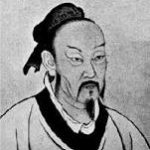 Born in 371, Mencius was a native of the state of Zou, in the present southern part of Shandong province. He was link to Confucius through his study under a disciple of Zi Si, who in turn was Confucius’ grandson. He was an eminent scholar, traveled to other states, vainly trying to get a hearing for his ideas among their rulers. He died in 289 B.C. (?) and represents the idealistic wing of Confucianism. |
行天下之大道;得志,与民由之。不得志,独行其道。富贵不能淫;贫贱不能移;威武不能屈;此之为大丈夫。
To walk in the great path of the world; when he obtains his desire for office, to practice his principles for the good of the people; when that desire is disappointed, to practice them alone; to be above the power of riches and honors to make dissipated, of poverty and mean condition to make swerve from principle, and of power and force to make bend–these characteristics constitute the great man. |
| 由是观之、无恻隐之心,非人也;无羞恶之心,非人也;无辞让之心,非人也;无是非之心,非人也。恻隐之心、仁之端也;羞恶之心、义之端也;辞让之心、礼之端也;是非之心、智之端也。From this it can be seen that whoever is devoid of the heart of compassion is not human, whoever is devoid of the heart of shame is not human, whoever is devoid of the heart of courtesy and modesty is not human, and whoever is devoid of the heart of right and wrong is not human. The heart of compassion is the germ of benevolence; the heart of shame, of dutifulness; the heart of courtesy and modesty, of the observance of the rites; the heart of right and wrong, of wisdom.
孟子见梁惠王。王曰:“叟不远千里而来,亦将有以利吾国乎?” 孟子对曰:“王何必曰利?亦有仁义而已矣。王曰‘何以利吾国’?大夫曰‘何以利吾家’?士庶人曰‘何以利吾身’?上下交征利而国危矣。万乘之国弑其君者,必千乘之家;千乘之国弑其君者,必百乘之家。万取千焉,千取百焉,不为不多矣。苟为后义而先利,不夺不餍。未有仁而遗其亲者也,未有义而后其君者也。王亦曰仁义而已矣,何必曰利?
… …
缪公亟見于子思,曰:‘古千乘之国以友士,何如?’ 子思不悦,曰,‘古之人有言曰,事之云乎,岂曰友之云乎?’ 子思之不悦也,岂不曰,‘以位,则子,君也;我,臣也;何敢与君友也?以德,则子事我者也,奚可以与我友’?
Mengzi had an audience with King Hui of Liang. The King said, “Sir, you have come, not regarding one thousand li as too far. Surely you will have something to profit my state?” Mengzi said in response, “Why must Your Majesty say, ‘profit’? Let there be benevolence and righteousness and that is all. Your Majesty says, ‘How can my state be profited?’ The Counsellors say, ‘How can my family be profited?’ The scholars and commoners say, ‘How can I be profited?’ Those above and those below mutually compete for profit and the state is endangered. “In a case where the ruler of a state that can field ten thousand chariots is murdered, it must be by a family that can field a thousand chariots. In a case where the ruler of a state that can field a thousand chariots is murdered, it must be by a family that can field a hundred chariots. One thousand out of ten thousand, or one hundred out of a thousand, cannot be considered to not be a lot. But if righteousness is put behind and profit is put ahead, one will not be satisfied without grasping from others. “There have never been those who were benevolent who abandoned their parents. There have never been those who were righteous who put their ruler last. Let Your Majesty say, ‘Benevolence and righteousness,’ and that is all. Why must you say ‘profit’?”
… …
‘During the frequent interviews of the duke Mû with Tsze-sze, he one day said to him, “Anciently, princes of a thousand chariots have yet been on terms of friendship with scholars;– what do you think of such an intercourse?” Tsze-sze was displeased, and said, “The ancients have said, ‘The scholar should be served:’ how should they have merely said that he should be made a friend of?” When Tsze-sze was thus displeased, did he not say within himself,– “In point of position, you are the prince and I am your subject. How dare I be friends with you? In point of virtue, it is you who ought to serve me. How can you presume to be friends with me?” |
生亦我所欲也、义亦我所欲也。二者不可得兼、舍生而取义也。生亦我所欲、所欲有甚于生者、故不为苟得也。死亦我所恶、所恶有甚于死者、故患有所不辟也。
Life is what I want; righteousness is also what I want. If I cannot have both, I would rather take the righteousness than life. I like life indeed, but there is that which I like more than life, and therefore I will not seek to possess it by any improper ways. I dislike death indeed, but there is something I dislike more than death, and therefore there are occasions when I will not avoid danger. |
故天将降大任于是人也、必先苦其心志、劳其筋骨、饿其体肤、空乏其身、行拂乱其所为、所以动心忍性、曾益其所不能。
That is why Heaven, when it is about to confer a great office on a man, always first tests his resolution, exhausts his frame and makes him suffer starvation and hardship, frustrates his efforts so as to shake him from his mental latitude, toughen his nature and make good his deficiencies. |
| 牛山之木尝美矣,以其郊于大国也,斧斤伐之,可以为美乎?是其日夜之所息,雨露之所润,非无萌蘖之生焉,牛 羊又从而牧之,是以若彼濯濯也。人见其濯濯也,以为未尝有材焉,此岂山之性也哉?虽存乎人者,岂无仁义之心哉?其所以放其良心者,亦犹斧斤之于木也,旦旦 而伐之,可以为美乎?其日夜之所息,平旦之气,其好恶与人相近也者几希,则其旦昼之所为,有梏亡之矣。梏之反复,则其夜气不足以存;夜气不足以存,则其违 禽兽不远。人见其禽兽也,而以为未尝有材焉者,是岂人之情也哉?故苟得其养,无物不长;苟失其养,无物不消。
There was a time when the trees were luxurious on the Ox Mountain. As it is on the outskirts of a great metropolis, the trees are constantly lopped by axes. Is it any wonder that they are no longer fine? With the respite they get in the day and in the night, and the moisening by the rain and dew, there is certainly no lack of new shoots coming out, but then the cattle and sheep come to graze upon the mountain. That is why it is as bald as it is. People, seeing only its baldness, tend to think that it never had any trees. But can this possibly be the nature of a mountain? Can what is in man be completely lacking in moral inclinations? A man’s letting go of his true heart is like the case of the trees and the axes. When the trees are lopped day after day, is it any wonder that they are no longer fine? If, in spite of the respite a man gets in the day and in the night and of the effect of the morning air on him, scarcely any of his likes and dislikes resemble those of other men, it is because what he does in the course of the day once again dissipates what he has gained. If this dissipation happens repeatedly, then the influence of the air in the night will no longer be able to preserve what was originally in him, and when that happens, the man is not far removed from an animal. Others, seeing his resemblance to an animal, will be led to think that he never had any native endowment. But can that be what a man is genuinely like? Hence, given the right nourishment there is nothing that will not grow, and deprived of it there is nothing that will not wither away.
Mencius, 5B:7
齐宣王问曰:“汤放桀,武王伐纣,有诸?” 孟子对曰:“于传有之。” 曰:“臣弑其君,可乎?” 子曰:“贼仁者谓之贼,贼义者谓之残。残贼之人谓之一夫。闻诛一夫纣矣,未闻弑君也。”(《梁惠王》下)
Xuan King of Qi asked Mencius, “Have you heard that King Tang of Shang Dynasty exiled King Jie of Xia Dynasty, and that King Wu of Zhou attacked the King Zhou of Shang Dynasty? Was this what happened?” Mencius replied, “Those who destroy humanity are referred to as scums; those who destroy rites are called degenerates. We call these people tyrants. I’ve only heard of the tyrant of Zhou being done away with but nothing about a king being killed by Zhou.”
孟子告齐宣王曰:“君之视臣如手足,则臣视君如腹心;君之视臣如犬马,则臣视君如国人;君之视臣如土芥,则臣视君如寇仇。”
Mencius told King Xuan of State Qi, “If and when the king views his ministers and generals as his own hand and foot, then the ministers and generals would regard him as their heart and soul; if and when the king views his ministers and generals as his horses and dogs, then they would regard him as strangers; if he views them as dirt and grass, then they would regard him as their arch enemies.”
桃應問曰:「舜為天子,皋陶為士,瞽叟殺人,則如之何?」孟子曰:「執之而已矣。」「然則舜不禁與?」曰:「夫舜惡得而禁之?夫有所受之也。」「然則舜如之何?」 曰:「舜視棄天下,猶棄敝履也。竊負而逃,遵海濱而處,終身欣然,樂而忘天下。」
Tao Ying asked, “With Shun as the king, what would his minister Gao Tao do if Gu Sou, the king’s father, murdered someone?” Mencius said, “Bring him to justice according to his duties, of course.” “Wouldn’t the King forbid it?” “How could the king forbid his official to carry out what he has trusted and empowered him to do?” “What should the King do then?” Mencius replied, “He should give up his kingdom sooner than he would a worn-out shoe, escape with his father to live by the sea with a clear conscience, and enjoy the rest of his life away from the world.”
|
中國論-On Central Kingdom, by 石介 (1005–1045)
Translated by Devin Fitzgerald and Maura Dykstra
夫天处乎上,地处乎下。居天地之中者曰中国,居天地之偏者曰四夷。四夷外也,中国内也。天地为之平内外,所以限也。夫中国者君臣所自立也,礼乐所自作也,衣冠所自出也,冠昏祭祀所自用也,縗麻丧泣所自制也,果瓜菜茹所自殖也,稻麻黍稷所自有也。
Heaven presides above and the earth presides below. That which is situated in the center of the two is known as “the middle kingdom. Those who dwell on the edges of heaven and earth are known as “the four outlanders.” The four outlanders are on the outside. The “central kingdom” is on the inside. The boundary between inner and outer was created to strike a balance in heaven and earth.
As for the central kingdom, its creation was a result of the lords and their ministers establishing themselves. It is made through its own ritual and music. It emerges from its own robes and caps. It is created by its own use of the practices of capping ceremonies, weddings, and sacrifices. It makes itself through the regulations of rough hemp mourning garments and tears of sorrow. It flourishes from its own nuts and fruits and vegetables and mushrooms. It possesses its own rice and hemp and millet and grains.
东方曰夷,被发文身,有不火食者矣。南方曰蛮,雕题交趾,有不火食者。西方曰日戎,被发衣皮,有粒食者。北方曰狄,毛衣穴居,有不粒食者。其俗皆自安也,相易则乱。仰观于天则二十八舍在焉,俯察于地则九州分野在焉,中观于人则君臣、父子、夫妇、兄弟、宾客、朋友之位在焉。
In the east there are those called the ‘Yi.’ They cut their hair and tattoo their bodies. Some eat without cooking the food they consume. In the south there are those called the ‘Man.’ In the plateaus of the southern lands they scar their bodies. Some eat without cooking the food they consume. In the west there are those called the ‘Rong.’ They cut their hair and wear hides. Some eat grain. In the north there are those called Di. They wear pelts and live in caves. They do not eat grains. If they all follow their own customs, they are at peace. When they change them, then there is chaos.
Look up to heaven. Observe the twenty-eight constellations within. Look below to the earth. Observe we can see the divisions of the nine domains.** Look within: observe how humans are cast into the positions of ruler and minister, father and son, husband and wife, older and younger brother, guest and host, and friends.** (Here referring to Yu the Great’s dredging of the rivers (as narrated in the Book of Documents), which is said to have created the great geographical divisions of the empire.)
非二十八舍、九州分野之内,非君臣、父子、夫妇、兄弟、宾客、朋友之位皆外裔也。二十八舍之外干乎,二十八舍之内是乱天常也。九州分野之外,入乎九州分野之内,是易地理也。非君臣、父子、夫妇、兄弟、宾客、朋友之位,是悖人道也。苟天常乱于上,地理易于下,人道悖于中国,不为中国矣。
Those who do not reside beneath the twenty-eight constellations, nor within the nine domains, nor in the positions of ruler and minister, father and son, husband and wife, older and younger brother, guest and host, and friends: they are beyond the frontiers. Those things beyond the houses of the twenty-eight constellations would, if performed within them, amount to a chaos which threatens the constants of Heaven. Those things outside of the nine domains would, if they enter, alter the very landscape. Those that do not have the positions of ruler and minister, father and son, husband and wife, older and younger brother, guest and host, or friend are none other than rebels against the way of mankind. If the constants of Heaven, above, are thrown into disorder, and the Earth, below, is itself transformed, and there is rebellion against the way of mankind within the central kingdom, then it is no longer the central kingdom!
闻乃有巨人名曰佛,自西来入我中国;有庞眉曰聃,自胡来,入我中国。各以其人易中国之人,以其道易中国之道,以其俗易中国之俗,以其书易中国之书,以其教易中国之教,以其居庐易中国之居庐,以其礼乐易中国之礼乐,以其文章易中国之文章,以其衣服易中国之衣服,以其饮食易中国之饮食,以其祭祀易中国之祭祀。
I have heard that there was a great man by the name of ‘Buddha.’ He came from the west and entered our central kingdom. Pang Mei has claimed that Laozi came from the outlander tribes and entered our central kingdom. Each of them changed the people of the central kingdom with their people. [Furthermore,] they each used their Way to change the Way of the central kingdom. They used their customs to change the customs of the central kingdom. They used their writings to change the writings of the central kingdom. They used their teachings to change the teachings of the central kingdom. They used their architecture to change the architecture of the central kingdom. They used their ritual and music to change the ritual and music of the central kingdom. They used their writing styles to change the writing styles of the central kingdom. They used their clothing to change the clothing of the central kingdom. They used their diets to change the diets of the central kingdom. [Finally,] they used their ritual sacrifices to change the ritual sacrifices of the central kingdom.
虽然中国人犹未肯乐焉而从之也,其佛者乃说曰:天有堂,地有狱,从我游则升天堂矣,否则挤地狱。其老亦说曰:我长生之道,不死之乐(药),从我游则长生矣,否则夭死。且又有为耒耜以使人农也,为诗书以使人士也,为器材以使人工也,为货币以使人商也。臣拜乎君,弟事乎兄,幼顺乎长冠,以束乎发带,以绳乎腰履,以羁乎足妻子,以侍养宾师,以须乎奉縗麻丧泣之制,使人为哀禋祭享之位,使人为孝尔之劳也。如是,我皆无是之苦。
When the people of the central kingdom were not yet willing to take joy [in these foreign paths] and follow them, the Buddha then said, “There is a Heaven above and Hell below. Follow me and ascend to Heaven, otherwise, you will be cast into hell.” Laozi also said, “My way of eternal life brings the joy of deathlessness. Follow me and live forever, otherwise you will die young.” He also claimed “We have none of the suffering brought by the plow which makes men into farmers; the poetry and books which make them scholars; the tools and materials which make them craftsmen; the goods and money which make them merchants. We also have no ministers bowing to lords; younger brothers serving older brothers; or juniors following seniors. We are not restrained by hair ties, nor tied by girdles at our waists. Our wives’ feet are unbound; we serve neither guest nor master; we do not follow rules of wearing hemp for mourning, nor do we offer austere sacrifices. We do not make people ‘filial’ and so cause them to labor.”
于是人或惧之,或悦之。始有从之者,既从之也,人则曰莫尊乎君。与之抗礼,无兄以事也,无长以从也,无妻子以养也,无宾师以奉也,无发以束也,无带以绳也,无縗麻丧泣以为哀也,无禋祀祭享以为孝也。中国所为士与农工与商者,我皆坐而衣食之。我贵也如此。故其人欢然而去之也,靡然而趋之也。噫。今不离此而去彼。
Following this, there were people who became fearful. Others were overjoyed. Some began to follower. Yet others followed those. Thereupon it was said of the people “None renders respect unto the ruler!” There was contention against the rites. Refusal to serve elder brothers. Unwillingness to be obedient to seniors. A lack of nourishment for wives and children. No honoring of guests or teachers. There was nothing to restrain them. There was nothing to bind them. There was no hemp or tears with which to mourn. There were no rites or sacrifices to perform filial piety. The middle kingdom, a conglomeration of officials and agriculturalists and craftsmen and merchants, feeds, supports, and clothes them all. Our honor and our worth is just like this. But formerly there were those who gleefully cast everything aside. With no sense of what was lost, they ran away from everything! Oh, humanity! You would refuse to forsake that which is here at the same time that you move toward what is there.
背中国而趋佛老者几人。或曰如此,将为之奈何?曰各人其人,各俗其俗,各教其教,各礼其礼,各衣服其衣服,各居庐其居庐。四夷处四夷,中国处中国,各不相乱,如斯而已矣,则中国中国也,四夷四夷也
The number that have truly turned their backs on the central kingdom and followed the Buddha are but a few. Some say: what can be done about this? I say: each person to his own personhood. Each custom to its own customs. Each teaching to its own teachings. Each ritual to its own rites. Each fashion to its own fashions. Each abode to its own houses. The four outlanders among the four outlanders. The central kingdom in the central kingdom. For each to not disturb the other. And that is all! For the central kingdom to be the central kingdom. For the four outlanders to be the four outlanders.
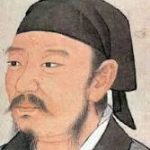
荀子 Xunzi 298-238 B.C.人之性、恶;其善,伪也。
“The nature of man is evil; his goodness is acquired through hypocrisy.” Xunzi
|
|
| 人之所以为人者,非特以二足而无毛也,以其有辨也。夫禽兽有父子而无父子之亲,有牝牡而无男女之别。故人道莫不有辩,辩莫大于分,分莫大于礼。Man is not truly man in the fact that he, uniquely, has two feet and no hair over his body, but rather in the fact that he makes social distinctions. Birds and beasts have fathers and offspring, but not the affection between father and son. They are male and female, but they do not have the proper separation between males and females. Hence in the Way of Humanity there must be distinctions. No distinctions are greater than those of society. No social distinctions are greater than the Li (rituals). |
|
Frederick W. Mote
|
|
The Problem of Evil, and Consequences of A World without Sin
 The late Dr. Hu Shih, eminent historian of Chinese thought and culture, used to say with sly delight that centuries of Christian missionaries had been frustrated and chagrined by the apparent inability of Chinese to take sin seriously. Were we to work out fully all the consequences for Chinese society of the model offered by an organismic cosmos functioning through the dynamism of harmony, we might well be able to relate the absence of a sense of sin to it. For in such a cosmos there can be no parts wrongfully present; everything that exists belongs, even if no more appropriately than as the consequence of a temporary imbalance, a disharmony. Evil as a positive or active force cannot exist; much less can it be frighteningly personified. No devils can struggle with good forces for mastery of humans and the universe, and people’s errors, unlike sin in other worlds, can neither offend personal gods not threaten a person’s individual existence. The question of immortality in a future that “really counts”–if one is lucky enough or good enough to transcend the material present reality–does not even arise. The being true in the Great Tradition, countertendencies in the popular religions in China’s highly congruent culture were correspondingly weakened. The consequence of such a definition of the problem of evil for the Chinese character seems to be something like the issue at stake in the frequently encountered distinction between shame cultures and guilt cultures. Whether this formula, derived by anthropologists from observations of relatively simple cultures, will have lasting value when applied to a civilization as complex as that of traditional China may be questioned. But it suggests that further hypotheses about Chinese traditional character and personality types might well be guided by some reference to a cosmology which apparently releases people from the mechanical workings of fear and sin doctrines, and offers them a less threatened and less threatening personal relationship to their cosmos. Yet Chinese ethical philosophy in all periods stresses the necessity to engage in self -examination and self-correction; the philosophic foundations for a moral responsibility were not lacking. The late Dr. Hu Shih, eminent historian of Chinese thought and culture, used to say with sly delight that centuries of Christian missionaries had been frustrated and chagrined by the apparent inability of Chinese to take sin seriously. Were we to work out fully all the consequences for Chinese society of the model offered by an organismic cosmos functioning through the dynamism of harmony, we might well be able to relate the absence of a sense of sin to it. For in such a cosmos there can be no parts wrongfully present; everything that exists belongs, even if no more appropriately than as the consequence of a temporary imbalance, a disharmony. Evil as a positive or active force cannot exist; much less can it be frighteningly personified. No devils can struggle with good forces for mastery of humans and the universe, and people’s errors, unlike sin in other worlds, can neither offend personal gods not threaten a person’s individual existence. The question of immortality in a future that “really counts”–if one is lucky enough or good enough to transcend the material present reality–does not even arise. The being true in the Great Tradition, countertendencies in the popular religions in China’s highly congruent culture were correspondingly weakened. The consequence of such a definition of the problem of evil for the Chinese character seems to be something like the issue at stake in the frequently encountered distinction between shame cultures and guilt cultures. Whether this formula, derived by anthropologists from observations of relatively simple cultures, will have lasting value when applied to a civilization as complex as that of traditional China may be questioned. But it suggests that further hypotheses about Chinese traditional character and personality types might well be guided by some reference to a cosmology which apparently releases people from the mechanical workings of fear and sin doctrines, and offers them a less threatened and less threatening personal relationship to their cosmos. Yet Chinese ethical philosophy in all periods stresses the necessity to engage in self -examination and self-correction; the philosophic foundations for a moral responsibility were not lacking.
———- Intellectual Foundations of China, pp.21-22
|
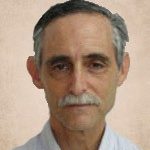 The Chinese [narrative] tradition has tended to place nearly equal emphasis on the overlapping of events, the interstitial spaces between events, in effect on non-events alongside of events in conceiving of human experience in time. In fact, the reader of the major Chinese narrative works soon becomes conscious of the fact that those clearly defined events which do stand out in the texts are nearly always set into a thick matrix of non-events: static description, set speeches, discursive digressions, and a host of other non-narrative elements. … The ubiquitous potential presence of a balanced, totalized, dimension of meaning may partially explain why a fully realized sense of the tragic does not materialize in Chinese narrative. Such characters as Prince Shen-sheng, Hsiang Yu, Yueh Fei, and even Chia Pao-yu clearly possess the qualities of the tragic figure to one extent or another. But in each case the implicit understanding of the logical interrelation between their particular situation and the overall structure of existential intelligibility serves to blunt the pity and fear the reader experiences as he witnesses their individual destinies. In other words, Chinese narrative is replete with individuals in tragic situations, but the secure inviolability of the underlying affirmation of existence in its totality precludes the possibility of the individual’s tragic fate taking on the proportions of a cosmic tragedy. Instead, the bitterness of the particular case of mortality ultimately settles back into the ceaseless alternation of patterns of joy and sorrow, exhilaration and despair that go to make up an essentially affirmative view of the universe of experience. The Chinese [narrative] tradition has tended to place nearly equal emphasis on the overlapping of events, the interstitial spaces between events, in effect on non-events alongside of events in conceiving of human experience in time. In fact, the reader of the major Chinese narrative works soon becomes conscious of the fact that those clearly defined events which do stand out in the texts are nearly always set into a thick matrix of non-events: static description, set speeches, discursive digressions, and a host of other non-narrative elements. … The ubiquitous potential presence of a balanced, totalized, dimension of meaning may partially explain why a fully realized sense of the tragic does not materialize in Chinese narrative. Such characters as Prince Shen-sheng, Hsiang Yu, Yueh Fei, and even Chia Pao-yu clearly possess the qualities of the tragic figure to one extent or another. But in each case the implicit understanding of the logical interrelation between their particular situation and the overall structure of existential intelligibility serves to blunt the pity and fear the reader experiences as he witnesses their individual destinies. In other words, Chinese narrative is replete with individuals in tragic situations, but the secure inviolability of the underlying affirmation of existence in its totality precludes the possibility of the individual’s tragic fate taking on the proportions of a cosmic tragedy. Instead, the bitterness of the particular case of mortality ultimately settles back into the ceaseless alternation of patterns of joy and sorrow, exhilaration and despair that go to make up an essentially affirmative view of the universe of experience.
Andrew Plaks——- Chinese Narrative, Critical and Theoretical Essays
|
 One absolutely central aspect of the concept of moral autonomy in Western philosophy involves distinguishing morality proper from conventional mores. … This basic element of autonomy in Western ethical theory generates the distinction between codes of etiquette, fashion, and customs, on the one hand, and morality on the other. Etiquette, fashion and customs are products of history. They are, from moral point of view, accidental. One can always ask whether one ought to follow accepted and established prescriptions. It does not follow from mere existence of any such system that its prescriptions are morally correct. It may fairly be asked if Confucius’s traditionalist political philosophy has this distinct concept of morality at all. One absolutely central aspect of the concept of moral autonomy in Western philosophy involves distinguishing morality proper from conventional mores. … This basic element of autonomy in Western ethical theory generates the distinction between codes of etiquette, fashion, and customs, on the one hand, and morality on the other. Etiquette, fashion and customs are products of history. They are, from moral point of view, accidental. One can always ask whether one ought to follow accepted and established prescriptions. It does not follow from mere existence of any such system that its prescriptions are morally correct. It may fairly be asked if Confucius’s traditionalist political philosophy has this distinct concept of morality at all.
Chad Hansen, “Punishment and Dignity in China” in
Individualism and Holism
|
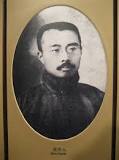
For instance, the Frenchman Maupassant’s Une vie is human literature about the animal passions of man; China’s Prayer Mat of Flesh, however, is a piece of non-human literature. The Russian Kuprin’s novel Jama is literature describing the lives of prostitutes, but China’s Nine-tailed Tortoise is non-human literature. The difference lies merely in the different attitudes conveyed by the work, one is dignified and one is profligate; one has aspirations for human life and therefore feels grief and anger in the face of inhuman life, whereas the other is complacent about human life, and the author even seems to derive a feeling of satisfaction from it, and in many cases to deal with his material in an attitude of amusement and provocation. In one simple sentence: the difference between human and non-human literature lies in the attitude that informs the writing; whether it affirms human life or inhuman life.
___Zhou Zuren “Humane Literature”, 1918, Modern Chinese Literary Thought. ed. Kirk Denton. Stanford UP, 1996. Pp.155-6
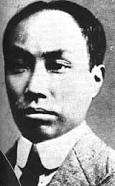 Chinese literature today is lifeless and stale, unable to stand next to that of Europe. . . . . The problem of Confucianism has been attracting much attention in the nation: this is the first indication of the revolution in ethics and morality. … The classical literature is pompous and pedantic and has lost the principles of expressiveness and realistic description. Eremitic literature is highly obscure and abstruse and is self-satisfied writing that provides no benefit to the majority of its readers. In form, Chinese literature has followed old precedents; it has flesh without bones and body without soul. It is a decorative and not a practical product. In content, its vision does not go beyond kings, officials, spirits, ghosts, and the fortunes or misfortunes of individuals. As for the universe, or human life, or society–they are simply beyond its ken. Such are the common failings of these three kinds of literature. Chinese literature today is lifeless and stale, unable to stand next to that of Europe. . . . . The problem of Confucianism has been attracting much attention in the nation: this is the first indication of the revolution in ethics and morality. … The classical literature is pompous and pedantic and has lost the principles of expressiveness and realistic description. Eremitic literature is highly obscure and abstruse and is self-satisfied writing that provides no benefit to the majority of its readers. In form, Chinese literature has followed old precedents; it has flesh without bones and body without soul. It is a decorative and not a practical product. In content, its vision does not go beyond kings, officials, spirits, ghosts, and the fortunes or misfortunes of individuals. As for the universe, or human life, or society–they are simply beyond its ken. Such are the common failings of these three kinds of literature.
___Chen Duxiu “On Literary Revolution,” Modern Chinese Literary Thought. p.144
|








 Chinese literature today is lifeless and stale, unable to stand next to that of Europe. . . . . The problem of Confucianism has been attracting much attention in the nation: this is the first indication of the revolution in ethics and morality. … The classical literature is pompous and pedantic and has lost the principles of expressiveness and realistic description. Eremitic literature is highly obscure and abstruse and is self-satisfied writing that provides no benefit to the majority of its readers. In form, Chinese literature has followed old precedents; it has flesh without bones and body without soul. It is a decorative and not a practical product. In content, its vision does not go beyond kings, officials, spirits, ghosts, and the fortunes or misfortunes of individuals. As for the universe, or human life, or society–they are simply beyond its ken. Such are the common failings of these three kinds of literature.
Chinese literature today is lifeless and stale, unable to stand next to that of Europe. . . . . The problem of Confucianism has been attracting much attention in the nation: this is the first indication of the revolution in ethics and morality. … The classical literature is pompous and pedantic and has lost the principles of expressiveness and realistic description. Eremitic literature is highly obscure and abstruse and is self-satisfied writing that provides no benefit to the majority of its readers. In form, Chinese literature has followed old precedents; it has flesh without bones and body without soul. It is a decorative and not a practical product. In content, its vision does not go beyond kings, officials, spirits, ghosts, and the fortunes or misfortunes of individuals. As for the universe, or human life, or society–they are simply beyond its ken. Such are the common failings of these three kinds of literature.